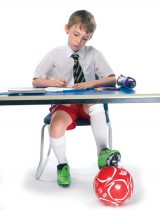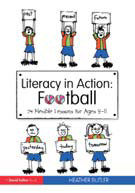You want to improve their writing, but they’re focused on football...
It’s September, and your new Year 6 class heaves with football fanatics. You wish you were still by the swimming pool with palm trees swaying above you. But you’re not; you’re earning money to pay for next year’s pool and somehow you have to make these children engage with their writing. An idea is evolving in your head. The sort you have when your mind is uncluttered.
You decide to put the evident football passion to good use, and create one-off literacy lessons based around it. Last term the head was very excited about boy-friendly teaching methods. You decide to put those ideas into practice and, just for fun, plan each lesson like a match.
• to physically do things to help them engage with their writing.
• short activities. They like to complete what they start.
• focused tasks. Long ago, your boys would have been hunter-gatherers – so they dislike wasting energy on irrelevant activities (it’s true!)
• immediate praise. Who doesn’t?
• to talk and rehearse their writing before picking up a pen.
• choice. This helps them feel they are in control.
• tasks where they achieve straightaway. Boys tend to be less likely than girls to persevere if they find an activity difficult.
• to know what their learning will lead to.
Game plan – learning intentions.
Training – preparation.
Warm up – revisit. Try to plug gaps in their understanding.
First half – introduce something related to thewriting task.
Half time – particularly Energetic Participation
Talk – out of seat activity.
Second half – writing task.
Shoot out – highlighting achievements ontarget sheets.
Extra time – extension/homework.
You reword levelled assessment criteria into child-friendly specifics. ‘Use common connectives’ is now ‘use the words and, but, then, so’. Next, you give each level a daft name - 2a becomes Penguin on Holiday; 4b is Nigel the Gnome about to eat his breakfast – to help make the lessons different.
For years you have thought how harsh the editing process can seem. Children struggle to write, only to be told to improve what they have done. Is this the time to try something out? So you add editing targets to each level - specifics for children to find in their writing to improve, a small, achievable strategy. It proves to be a really good idea, especially for middle ability children who can be independent when given a push in the right direction. For example:
• Use a thesaurus to find better verbs.
• Put in some adverbs to bring a sentence to life.
• Improve sentences by making them longer or shorter.
• Improve sentences by giving more information.
With targets in place, you name your four groups – Paperclip Premiers (level 2), Chosen Champs (lower and secure level 3), Dream Division (high level 3 and lower 4) and Longstop Leaguers (above secure level 4) – and are ready to plan.
Over the summer holidays children seem to have forgotten all about commas and question marks (though not exclamation marks). The first football lesson deals with this. Children use non-fiction books to create a quiz, presided over by Quiz Master Quibble. As they write questions and answers children must find ways to use different types of punctuation, depending on their ability.
The lesson goes well – fast-paced and with each short activity having a definite ‘this is what you will be able to do’ reason for engaging with it. The children like the different lesson format and nonfootballers enjoy knowing there will be alternatives to write about; so everyone is happy.
They wiggle around chanting a rap about questions needing question marks at Half Time. Then footballers wallow in statistics while others write about whatever tickles their fancy (you now know one of them is nuts about yellow diggers). At the end of the lesson, Quiz Master Quibble wears a silly hat and chairs the quiz.
Football proves to be a rich vein with which to work. The 1958 Manchester United plane crash is the backdrop for exploring everything from adjectives (Paperclip Premiers), speech marks (Chosen Champs), and punned headlines (Dream Division) to expressing opinions (Longstop Leaguers). For this lesson you create four detailed, differentiated scaffolds. Children know exactly what they must write. They do not produce reams of script but they do engage with what they have to include to achieve the next level of writing, and these target driven lessons definitely help raise their confidence.
Other lessons are not so target driven or work with such detailed scaffolds. Variety keeps the lessons unpredictable. Content ranges from wheelchair football to Walter Tull (one of England’s first black professional footballers), Ladies’ Football to scripting and performing adverts.
Your favourite is about the football match German and English troops played on Christmas Day in 1914. You are observed teaching it. The head smiles and writes nice things, not least about the children’s enthusiasm. Poems written during the lesson contribute to an Armistice Day assembly.
 “Have we got Football tomorrow?” a lone voice with scuffed shoes asks as you cradle your coffee cup in the middle of the playground. You give an affirmative nod.
“Have we got Football tomorrow?” a lone voice with scuffed shoes asks as you cradle your coffee cup in the middle of the playground. You give an affirmative nod.
“Good,” he says and smiles.
It’s literacy he is talking about, not PE.
They’ve done all right this year. So have you. Your experiments with what makes boys engage with their writing have spilled over to other areas of the curriculum. You were doing some of it before; you do a load more of it now - and have a bank of one-off literacy lessons to reuse on the next batch of Year 6 hopefuls.
But that is next year. A different swimming pool beckons in less than two months and you can already hear the palm trees rustling in the breeze.
 Twenty four of the above lessons were morphed in to Literacy in Action: Football, recently published by Routledge (routledge.com/teachers, ISBN 978-0-415-56486-1).
Twenty four of the above lessons were morphed in to Literacy in Action: Football, recently published by Routledge (routledge.com/teachers, ISBN 978-0-415-56486-1).
Heather Butler, who wrote them, teaches on a Thursday and Friday at Manor Farm Community Junior School, Hazlemere, Bucks.
On other days she either writes or delivers writing workshops where the whole school does writing things all day. She also leads inset training and can be contacted through her website http://www.heatherbutler.info
Pie Corbett’s bike poems
Topic
Use coaching to turn failures into learning success
Ace-Classroom-Support
Help Pupils Tell Fact From Fiction In The Digital World
Ace-Computing
